Catering to each child’s individual needs can be both exhausting and satisfying. Taking part in someone’s life so early on and helping them grow is a privilege in itself. That is if you enjoy the company of babies. Whether you have a college degree or not, childminding is always an option. There is always a shortage in childminding business. If you are good with babies, why not try it out? Everything you need to know about how to become a childminder in one place!
Table of Contents
Who is a Childminder?
A childminder provides childcare from the comfort of their own home. But a childminder is more than just a care provider. Along with high-quality care, they also provide a learning environment for the children.
To be more specific, a childminder is a person who receives payment for looking after at least one child for more than two hours a day in their own home. They can also look after children at the home of another childminder or a relative of the childminder, but that premises need to be registered. This is very important to remember if you truly want to know how to become a childminder.
What does a childminder do?
The childminder has to take care of all the needs of the child for the duration of the child’s stay with them. Some typical tasks of a childminder include –
- Planning, preparing and serving balanced meals
- Help with bathing, dressing and eating meals
- Changing nappies and making bottles for small babies
- Let them take part in both indoors and outside activities and join them from time to time
- Guiding activities such as drawing, painting, dancing and
- Supervising children on trips outside, for example, go shopping or to the park
- Taking children to the nursery, school or playgroup
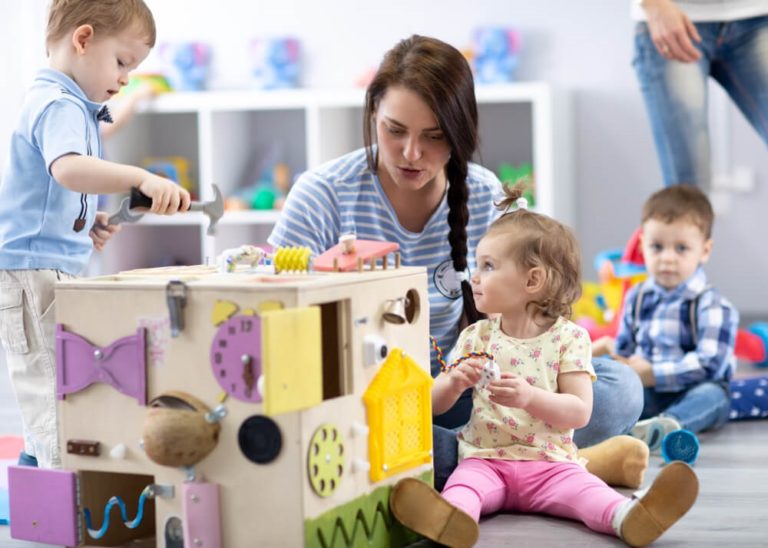
Discuss each child’s needs with their parents regularly. Every child is different, and they have different needs.
Childminding Requirements
Even though you can be a childminder from your home, it’s not an easy process. The first thing you need to learn about how to become a childminder is the requirements. There are several legal requirements that you need to consider if you want to become a childminder.
Before you set out to work as a childminder, you will have to fulfil some legal requirements. The first thing you’ll need to do is register with the governing body of the country you live in. For instance –
- If you live in England, you have to register with Ofsted.
- If you live in Scotland, you will have to register with Care Inspectorate.
- In case you reside in Wales, you must register with Care Inspectorate Wales.
- To register as a childminder in Northern Ireland, contact your local Health and Social Care Trust (HSCT)
The process of registering with Ofsted changes based on the ages of the children in your care. For children in Reception class or younger, you must register with the Early Years Register. If you care for children aged 5-7, it is mandatory to register on the Childcare Register. And for children aged 8 and above, it is optional to register on the Childcare Register.
After you’ve registered with the relevant government body, you’ll need to apply for a Disclosure and Barring Service (DBS) check. You’ll need a DBS check for yourself and anyone over 16 that lives in your house (even if they will never come into contact with the children in your care). Besides, if anyone over the age of 16 frequently visits your home, they need a DBS check. There are also some training requirements that a childminder needs to have to start working.
Checklist of Requirements to Become a Childminder:
Here is a checklist consisting of all the legal requirements that you must fulfil to become a childminder:
- DBS check.
- A certificate from governing body stating that you meet the requirements
- Registration with the Childcare Register or the
- Early Years Register.
- Health Declaration Form.
- Introductory EYFS training.
- Public Liability Insurance.
- Take a Paediatric First Aid course.
- Introduction to Childcare Practice course.
- Training on safeguarding.
- Proof that your home is safe for children.
- Safety tools such as a working fire alarm and fire control equipment.
Hopefully, this checklist will be very helpful in your journey of learning how to become a childminder to actually becoming one yourself.
How Long Does It Take to Become a Registered Childminder?
In general, it takes up to 12 weeks to complete registration with Ofsted. However, the amount of time can vary depending on various factors, such as receiving your paediatric first aid certificate, getting your DBS certificate, and sorting out your health declaration form.

Ofsted will visit your home to conduct their assessment during this period. During the inspection process, Ofsted will ask for your DBS certificate. But due to the nature of childminding work, you will be required to have an enhanced DBS check instead of a standard check. And an enhanced check can take up to eight weeks.
Since millions of DBS checks are carried out every year, it might take longer at times. Therefore, you should make sure you have your DBS certificate before the Ofsted inspection to prevent any delays.
Also, you need to ensure you have other required certificates before the inspection too. For instance – Paediatric First Aid, Safeguarding and Food Hygiene, and any insurance coverage papers. If you fail to fulfil these requirements, it may result in your application being delayed.
What is the Registration Process to Become a Childminder?
The most crucial part of knowing ‘how to become a childminder’ is the registration process. Ofsted is the Office for Standards in education, children’s services, and skills of the UK government. Ofsted ensures that only people who are suitable and ready to provide childcare are registered. It inspects and regulates services that care for children and young people.
You have to register with Ofsted or with any childminder agency. It is considered a criminal offence to provide unregistered childcare when you are legally required to register. So you should know if you need to register or not.
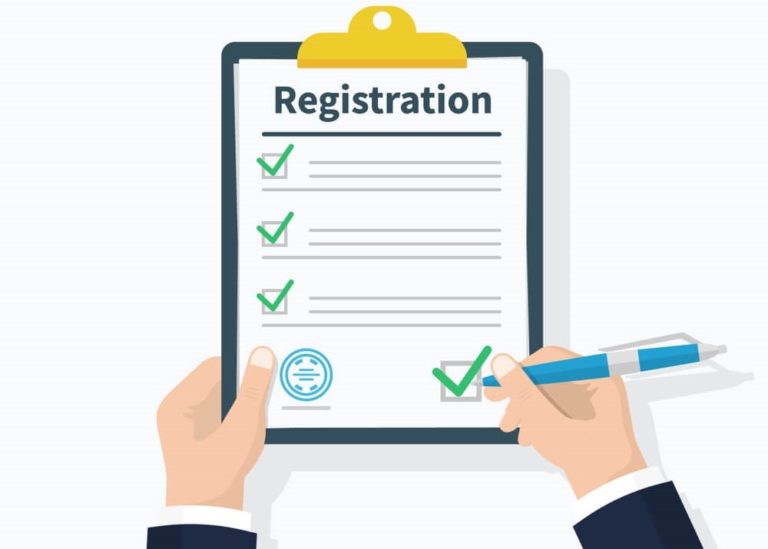
Do You have to Register?
Under the following circumstances, you don’t have to register under Ofsted. But you can still register if you want to.
- Only take care of children aged eight and over
- Provide childcare for fewer than two hours a day
- If you are the child’s parent, step-parent, foster parent, or relative
- If you care for children in their own home (such as a babysitter)
- If you look after a friend’s child for up to three hours per day (free or paid)
- Only look after a child between 6 pm and 2 am (for example, when babysitting)
- Provide home education
- Tutoring children aged three and over
You need to register if you don’t fall under any conditions mentioned above. And if you look after at least one child for more than two hours a day for payment.
This is Why You Should Register
If you are thinking about why you should register, aside from legal requirements. Here are some reasons why you should register.
- For professional development, advice and support network
- Reassure parents, and be able to claim childcare costs
- To get a childcare business grant that’ll help with setting up costs.
Where to Register?
To become a registered childminder under Ofsted, you will need to be listed on one or both of the following registers:
The Early Years Register
It is mandatory to register on this if you want to look after children from newborns to 31st August after their fifth birthday.
The Childcare Register
This is compulsory for those who look after children aged five to a child’s eighth birthday.
Apply to Become a Childminder
Firstly, you need to apply online to become a childminder. You will need to provide details of the following to register:
- Enhanced criminal record (DBS) check
- First aid training
- Childcare training
- A completed health declaration booklet
- Contact details for 2 references
Registration may take up to 12 weeks from submitting your application. It may vary depending on the type of registration you apply for.
Submit Documents
After filling up the application, you need to submit the necessary documents. However, you don’t need to send all the documents at the same time or in any particular order. After that Ofsted will acknowledge receipt of your application. Then they will check the information to see if you’re fit to be a childminder.
Ofsted Inspection Visit
Ofsted carries out a rigorous pre-registration visit before registering. If you apply for the Early Years Register, Ofsted will arrange a registration visit. During the visit, the inspector will check your understanding of the EYFS along with the following-
- Your identity
- How many children you can care for and what age group
- Documents about qualifications and first aid
- Suitability of your premises, equipment, and toys
- Understanding of risk assessment, safety, and security
- Knowledge of the safeguarding, welfare, and learning and development requirements
- Proficiency in English — to teach children and keep records in English.
If the checks are satisfactory, Ofsted will send you a letter and certificate of registration. In case you don’t fulfil any requirements, you’ll receive a notice of intention. Which means you are disqualified and refused registration to become a childminder.
Check Registration For Childminders for more information on registering as a childminder.
What Happens After Registering as a Childminder?
What happens after the registration, in the process of how to become a childminder? Well, after registration, your information will be published on the official website of Ofsted. This means you are free to be a childminder and allowed to take care of children. There are some things you should keep in mind after registration.
- You may have to undergo inspections from time to time, depending on the register.
- Keep your details up to date. You need to report any changes within 14 days. For instance,
- Where you are working
- Your contact details
- Childcare hours
- Report new adults staying at home or leaving home
- Report if any serious accident occurs (related to childminding)
- If you live or work with a childminder, get a background check
- Pay Ofsted annual registration fee
Start-up Costs to Become a Childminder
If you want to know how to become a childminder, be prepared for the startup costs. Because same as any kind of business, there is a startup cost in childminding business too. Here’s a list of expenses to help you budget for your childcare business.
1. Registration Costs
2. Medical Check/GP Fee
3. DBS Check
4. Paediatric First Aid Training
5. Child Care training
6. Safeguarding Training
7. Introductory EYFS Training
8. Other Training Requirements
9. Insurance Premium
10. Resources, Equipment, and Repairs
Registration Costs
The registration fee varies depending on the age of the children you will be caring for and the register you join. This is an annual payment. The Early Years Register, for children aged five and under, has a £35 fee. And the Ofsted Childcare Register, for children over the age of five, costs £103. But if you register for both, the fee is £35.
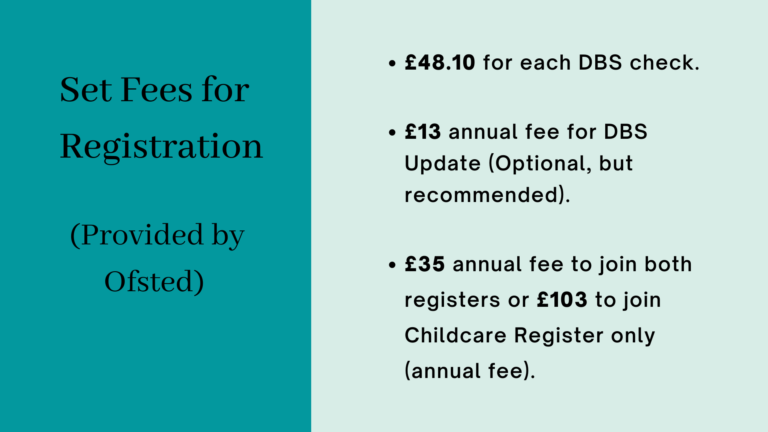
Medical Check/GP Fee
You will have to receive a health check from a GP to confirm that you have no medical issues that would affect your ability to care for children. Your doctor or GP will complete the Health Declaration Form and send it to Ofsted. The cost of this will vary depending on your GP. It can be roughly £50 to £150, but it would be best to contact them directly.
DBS Check
You’ll need to pay for a DBS check for yourself and each person over 16 who lives or works in your home. It’ll cost you £40 to get an enhanced DBS check. Also, we recommend renewing your DBS check every 1-3 years, so you may want to factor this into your annual budget. For more information on how to obtain a DBS form and what process to follow, check out this government page.
Necessary Training Expense
Before you can apply to Ofsted, you must complete some mandatory training.
Paediatric First Aid Training
You will need to complete a paediatric first-aid course. This has to be renewed every three years. Standard paediatric courses cover how to care for a child/infant in the event of any emergency. For instance, if they are ill or injured. You can choose this course offered by One Education on Paediatric First Aid Course – CPD Accredited.
Child Care training
To become a childminder, knowledge about child protection and child care is critical. You need to complete a local authority-approved childminder training course. Or take an online course like this one – Child Development and Care.
Safeguarding Training
Many local authorities may ask for safeguarding training, especially from new childminders. This training can also be done online – Safeguarding Children Level 1, 2, and 3. It would help if you stay updated, so you may take this training every three years.
Introductory EYFS Training
You also have to complete introductory training requirements of the Early Years Foundation Stage framework requirements. But if you already hold an Early Years qualification, you don’t need this training. However, you can expect to pay £50-£200 for this training.
Other Training Requirements
Any other requirements may vary. However, some training would be helpful in the areas of Food Hygiene, Fire Safety, Internet Safety, etc. In addition, suppose any of the children in your care have additional needs, such as Autism Spectrum Disorder (ASD) or Dyslexia. In that case, you may want to obtain additional training to ensure you can fulfil their specific needs. The costs of these certificates will vary, but you can wait for discount offers in One Education.
Insurance Premium
All registered childcare providers like childminders are required by law to have insurance. They usually choose Public Liability Insurance (PLI). It will cost between £25 and £100. You will also need home and car insurance.
Resources, Equipment, and Repairs
Not all resources and equipment are mandatory, but parents prefer them and help your business flourish. You’ll also need to conduct a risk assessment to determine what child-proofing needs in your house. Resources you will need to buy are – car seats, baby feeding chairs, changing mats, a first aid kit, child-friendly eating and drinking accessories, safety gates, toys, games, and books. But, again, these can vary depending on the age of the children.
Lastly, it would be wise to consider the cost of repair or replacement of any resources in your annual budget.
Business Grants for Childminders
Knowing how to become a childminder and becoming one is totally different. Some people have a difficult time coming up with the required startup capital. That’s why there are many business grants for childminders.
Up until 2019, childminders had access to a Childcare Business Grant. Unfortunately, this opportunity is now unavailable, and there are no plans to restart it. However, it is possible to obtain start-up loans. You can take a loan from the government, or you can look for other grants. Here are a few available options –
National Enterprise Network (NEN)
The National Enterprise Network will offer representation, promotion, and connections to help grow your business. In addition, they provide advice on managing your start-up costs and allow you access to any available grants or loans.
The Prince’s Trust
The Prince’s Trust provides necessary funding and advice to people below the age of 30. They will help you open your childminding business and award a grant to pay for any training or courses you need.
New Enterprise Allowance
New Enterprise Allowance helps those who are currently unemployed and are looking to open their own business. They will provide mentoring and allowance up to £1300 to support you financially to launch your business.
SEN Inclusion Funding
If you care for children with SEN diagnosis or need extra support, you can apply for additional funding. And you might receive monetary help –
- 15 hours (maximum) for a child up to two years old
- 30 hours for a child aged 3 to 4 years old.
For more information about completing an application, you can contact your local authority. There are other grants available depending on where you live. In addition, you can look for finance and support for your business.
How Many Children Can You Look After?
Legally, registered childminders can only look after a certain number of children at a time. How many children you can take care of at a time depends on a few factors, such as –
- How long you will provide care
- Ability to meet the EYFS criteria
- Ensure the learning and development requirements for each child.
- Have the necessary equipment, resources, and furniture for additional children.
- Assessment and mitigation of the risks in taking on additional children.
- Ensure that you have enough time for all children.
Here are the legal limits for the number of children a registered childminder can look after –
Age
Number of children
- Under 8 years
- Up to 6
- 0 - 5 years (31st August following their 5th birthday)
- Not more than 3
- Under 12 months
- Not more than 1
Exceptions to the ratios are allowed if you show you can meet all the children’s needs. Although, you can’t look after more than six children at a time. These numbers will include your own children. Additionally, any children you are responsible for such as foster children. You can look after more children with other childminders or if you have assistance. But usually, this is an agreed-upon set up between parents and childminders.
However, the recommendations set out on how many children a childminder can care for at a time vary within different countries in the UK.

England
As per the Statutory Framework for the Early Years Foundation Stage, you can look after a maximum of six children under the age of eight in England. And only three of these children can be under five years old, and only one child can be below one year of age. Also, if you have your own children under 8, this ratio includes them. You can also take care of children older than eight simultaneously, but only if it doesn’t affect the care of those needing EYFS provisions.
However, there are a few exceptions to these rules. If you work with another childminder or have an assistant, you need to check the rules in section 3.43 in the EYFS Statutory Framework. But these are subject to Ofsted’s stipulations.
Also, you should know that you can only leave children with an assistant for two hours in a single day, and even then, you will need parental permission to do so. If you can establish that you are meeting the needs of the children in your care, you may be allowed further exceptions.
Wales
National Minimum Standards for Regulated Childcare for Children Up to the Age of 12 Years states how many children childminder care for, who lives in Wales. A childminder can take care of a maximum of 10 children under 12 years old in Wales. And among these 10 children –
- No more than 6 children under the age of 8.
- 3 or fewer children under the age of 5.
- No more than 2 children under the age of 18 months, but exceptions may be made for siblings.
Some exceptions for these ratios are –
- If you have an assistant.
- If the children are aged between three and five; plus they attend full-time education, then they are to be considered over five years old in your ratio calculation.
Please note that the Welsh ratio includes the childminder’s children too.
Scotland
Childminders who live in Scotland have to follow the guidelines set by the National Care Standards. In Scotland, a childminder can care for a maximum of six children below 12 years of age. And there should be a maximum of three children e\who are below primary school age and only one child below one year of age.
However, if childminders in Scotland want to care for more than six children, they will need to apply for planning permission or have an assistant/ another childminder working in the setting.
How Much Can You Earn from Childminding?
It is only natural that you’d like to know how much you can earn from childminding. Well, most childminders usually set their own rates. What you can charge depends on –
- What area you live in
- How many hours you work for
- The number of children you care for
You can also charge more for older children. You can choose a daily fee instead of charging for hours. Do some research within your local area. And then fix a competitive price or go for similar prices. While fixing your rate, consider the fact that some amount of money will be spent for job purpose.
According to a survey conducted by PACEY (2017), a childminding agency, childminders in England charge between £3.00 and £10.00 per hour. Although the average childminder hourly rate is £4.64.
You can also charge more for older children. You can choose a daily fee instead of charging for hours. Do some research within your local area. And then fix a competitive price or go for similar prices. While fixing your rate, consider the fact that some amount of money will be spent for job purposes.
What Skills & Abilities will You Need as a Childminder?
Learning how to become a childminder is not limited to knowing just the legal requirements; parents will also want to know how competent you are at childminding. For instance, one of the basic qualities that parents look for in a childminder is how good you are with children. Apart from that, a childminder needs these qualities to perform their childminding duties.
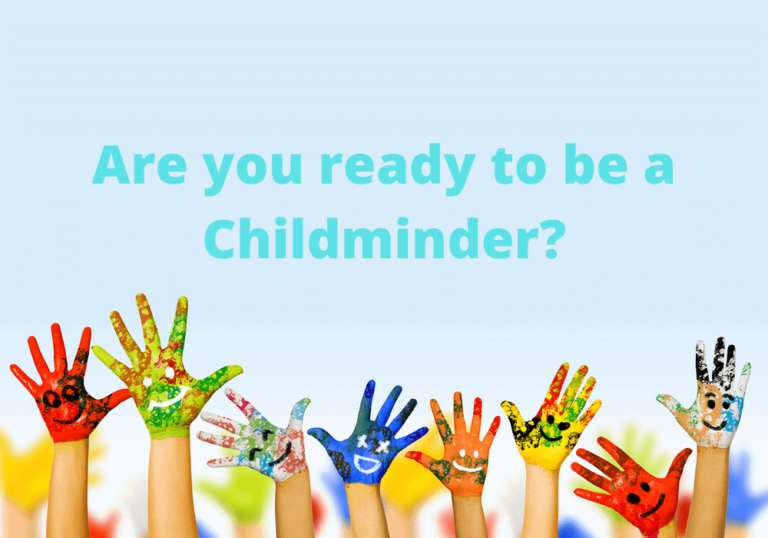
Responsible and Trustworthy
One of the first qualities parents look for in a childminder is their trustworthiness as every child is precious to their parents. No parent wants to leave their children with someone they don’t trust for even a minute, let alone for hours on end.
They also want someone responsible enough to care for their child. And during their early years, they are very vulnerable and needy. This is why parents want their children with someone responsible.
Interpersonal Skills
Interpersonal skills are a basic requirement in any job. These skills are used to communicate and interact with other people. Interpersonal skills refer to the combination of the following skills.
- Verbal & non-verbal communication
- Listening skills
- Negotiation
- Problem-solving
- Decision-making
The better you are at these skills, the more competent you are in any job setting.
A childminder has to spend time with children in their formative years. That is the time when they learn how to communicate. A childminder with good interpersonal skills can facilitate their learning process. Good communication skills help with social and cognitive development. Furthermore, this skill is necessary to work effectively with children, parents, and others.
On the other hand, lack of communication can lead to a bad interpersonal relationship with parents. It can also affect their efficiency and effectiveness in childcare. Moreover, poor interpersonal skills and communication gap leads to negativity and mistrust.
Some key features for effective interpersonal skills include –
- Listen carefully
- Show empathy
- Be considerate of other people’s feelings and moods
- Adjust your communication method according to the situation and people
- Show interest in other people
- Show respect and maintain confidentiality
- Be friendly while remaining professional
- Avoid stereotyping based on age, gender, ethnicity etc.
- Show respect towards others views, traditions, and beliefs
Patience
While we know that patience is a virtue, it is especially true in childcare. Babies and children need a lot of patience to deal with. Also, childcare can be very stressful. Not having patience will increase burnout and make you feel drained. Therefore, you won’t be able to accomplish as much as you want every day.
Losing temper on small things will not help the children. That way they won’t understand the gravity of a serious situation. By showcasing patience, you will prove yourself a good role model for the children.
Calm and Efficient in Emergencies
With children, you never know when there could be an emergency. For example, a baby might choke on a toy just when you look away for a second. To handle such emergencies, you need to stay calm and think instead of panicking. Previous training or knowing about possible emergencies helps in such situations. You will know what to do and be able to handle it properly.
Multitasking
You have to be good at juggling competing demands for attention. Babies constantly seek attention and need care. Therefore, to keep them pacified, a childminder has to pay much attention to the baby. While it is easy to take care of one baby, it is not easy to juggle 3 or 4 babies simultaneously.
For most people, taking care of one baby is challenging. In order to become a childminder, doing multiple tasks at the same time is a must.
Open-minded Regarding Different Ways of Bringing up Children
Every parent wants the best for their child. But this does not mean they all have a similar view on how to care for their children. Everyone has their own parenting style. While some parents only breastfeed their children, some prefer formula. A childminder has to listen to each parent on how to care for their babies.
Aware of Child Protection and Safety Issues
This is one of the most important things that is needed to provide childcare. A childminder must have sufficient knowledge about child safety issues. Such as – childproofing, allergies & safe eating, household hazards, and playground hazards. These are necessary to keep the baby safe from any kind of harm. Additionally, knowing about these helps to take immediate action in case of an emergency.
Tips for Improving Childminding
Pat yourself on the back because you have already got a head start by learning how to become a childminder. But there is always room for more improvement, so here are a few tips on how you can maximise your childminding abilities.

Ensure a High-quality Learning Environment
Prepare a play-based curriculum which aims to make excellent progress on children’s development. Teaching them new things and supporting their ongoing interests is very important in their early years. This is necessary for their cognitive development.
Read More:
1. 10 Ways Parents Can Get Involved in Child’s Education
2. Working With Autistic Children: A Complete Career Guide
3. Communication Skills for Children: Importance, Activities & Games
4. The Importance of Early Childhood Education
Continuously Train Yourself
If you truly care about children and childcare, you know that you can do much more for them. For continued development, you can attend courses like Child Development and Care online. You can also keep up to date on topics like child welfare, protection and better care options.
Promote Your Childminding Business
It might not be a full-grown business. But you need to advertise and get the word out there. If people don’t know you are providing childminding services, you will not have any customers.
Closing notes
Now you have comprehensive knowledge about how to become a childminder. You can easily start your childminding business from your home. Enjoy those heart-stopping, heavenly smiles and help them grow while providing high-quality caregiving. Enrich your childminding knowledge & capabilities by learning more about Child Development and Care.
Recent posts
- What are Functional Skills? From Theory to Practice
- How Old Must You Be to Buy Paracetamol
- What is the Modal in Maths? Mode, Modal, and Mean Explained
- How to Support People with Learning Disabilities?
- How to Be a Primary Teacher: Best Practices and Insights
- 21 Duties of a Health & Safety Officer You Must Know
- Collaborating with SENCOs: Best Practices for Teachers
- Top 6 Online Courses to Improve Your English Writing Skills
- Can You Reheat Chicken? Tips for Safe and Delicious Leftovers
- How to Set a Table: From Basic to Elegance







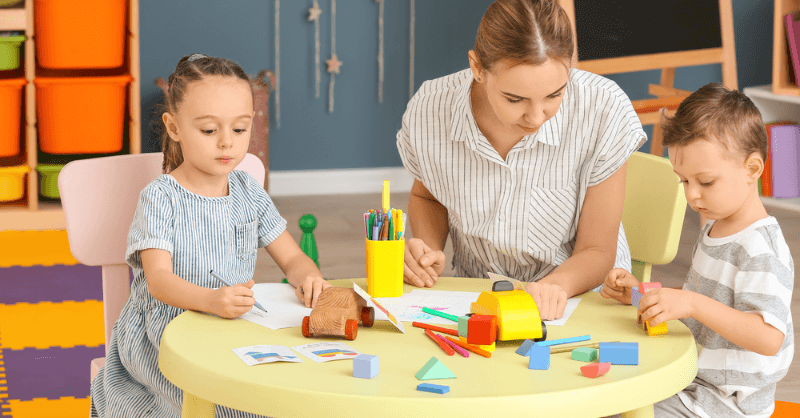
 February 14, 2021
February 14, 2021
















